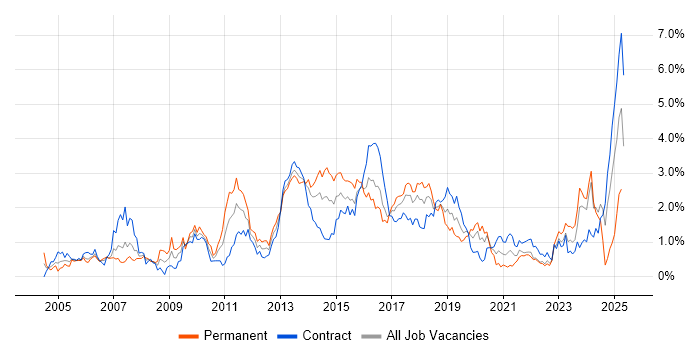JUnit
Scotland > Glasgow
The table below provides summary statistics for permanent job vacancies advertised in Glasgow requiring JUnit skills. It includes a benchmarking guide to the annual salaries offered in vacancies that cited JUnit over the 6 months leading up to 29 May 2025, comparing them to the same period in the previous two years.
| 6 months to 29 May 2025 |
Same period 2024 | Same period 2023 | |
|---|---|---|---|
| Rank | 52 | 84 | 108 |
| Rank change year-on-year | +32 | +24 | +11 |
| Permanent jobs citing JUnit | 12 | 214 | 21 |
| As % of all permanent jobs advertised in Glasgow | 2.28% | 5.34% | 1.38% |
| As % of the Development Applications category | 20.00% | 27.61% | 9.86% |
| Number of salaries quoted | 1 | 5 | 21 |
| 10th Percentile | - | - | £61,250 |
| 25th Percentile | £67,500 | - | £65,000 |
| Median annual salary (50th Percentile) | £70,000 | £80,000 | £67,000 |
| Median % change year-on-year | -12.50% | +19.40% | -8.22% |
| 75th Percentile | £72,500 | £95,000 | £73,750 |
| 90th Percentile | - | - | £75,000 |
| Scotland median annual salary | £63,750 | £87,500 | £67,000 |
| % change year-on-year | -27.14% | +30.60% | -0.74% |
All Development Application Skills
Glasgow
JUnit falls under the Development Applications category. For comparison with the information above, the following table provides summary statistics for all permanent job vacancies requiring development application skills in Glasgow.
| Permanent vacancies with a requirement for development application skills | 60 | 775 | 213 |
| As % of all permanent jobs advertised in Glasgow | 11.41% | 19.35% | 14.01% |
| Number of salaries quoted | 26 | 90 | 108 |
| 10th Percentile | £41,250 | £36,250 | £42,500 |
| 25th Percentile | £52,500 | £41,250 | £46,875 |
| Median annual salary (50th Percentile) | £72,250 | £47,500 | £57,500 |
| Median % change year-on-year | +52.11% | -17.39% | +4.55% |
| 75th Percentile | £82,563 | £64,750 | £67,500 |
| 90th Percentile | £103,750 | £80,000 | £73,750 |
| Scotland median annual salary | £55,000 | £59,526 | £60,000 |
| % change year-on-year | -7.60% | -0.79% | +3.57% |
JUnit
Job Vacancy Trend in Glasgow
Job postings citing JUnit as a proportion of all IT jobs advertised in Glasgow.

JUnit
Salary Trend in Glasgow
3-month moving average salary quoted in jobs citing JUnit in Glasgow.
JUnit
Co-occurring Skills and Capabilities in Glasgow by Category
The follow tables expand on the table above by listing co-occurrences grouped by category. The same employment type, locality and period is covered with up to 20 co-occurrences shown in each of the following categories:
|
|
||||||||||||||||||||||||||||||||||||||||||||||||||||||||||||||||||||||||||||||||||||||||||
|
|
||||||||||||||||||||||||||||||||||||||||||||||||||||||||||||||||||||||||||||||||||||||||||
|
|
||||||||||||||||||||||||||||||||||||||||||||||||||||||||||||||||||||||||||||||||||||||||||
|
|
||||||||||||||||||||||||||||||||||||||||||||||||||||||||||||||||||||||||||||||||||||||||||
|
|
||||||||||||||||||||||||||||||||||||||||||||||||||||||||||||||||||||||||||||||||||||||||||
|
|
||||||||||||||||||||||||||||||||||||||||||||||||||||||||||||||||||||||||||||||||||||||||||
|
|
||||||||||||||||||||||||||||||||||||||||||||||||||||||||||||||||||||||||||||||||||||||||||
|
|||||||||||||||||||||||||||||||||||||||||||||||||||||||||||||||||||||||||||||||||||||||||||
